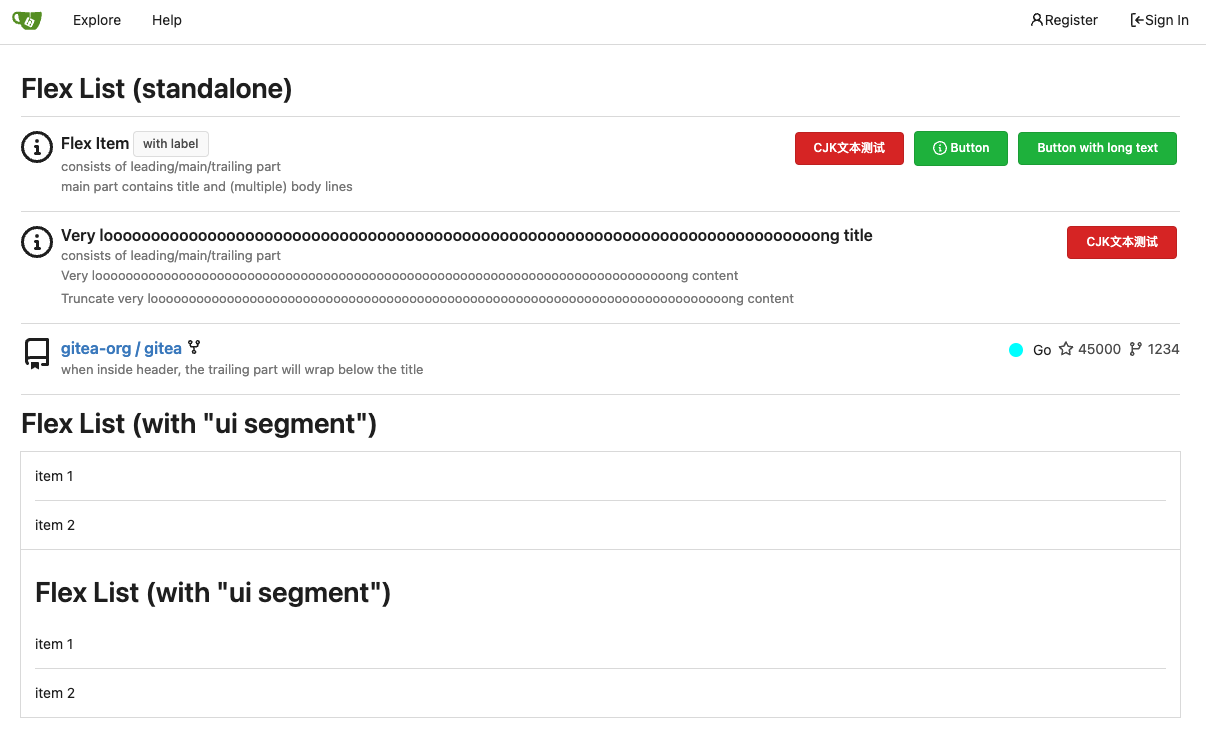mirror of
https://codeberg.org/forgejo/forgejo.git
synced 2024-11-22 08:42:32 -05:00
Replace #26761 It's better to keep children elements simple, and let parent containers layout the necessary padding/margin. The old `not(:last-child)` and `.flex-item + .flex-item` are not easy to maintain (for example, what if the developer would like to use a "tiny height" item?) The old approach also makes some UI look strange because the first item doesn't have proper padding-top. In this PR, we just simply use `.flex-item { padding: ... }`: * Developers could manually set the item height they want easily * It's easier to make it work with various containers -- with padding (`ui segment`) and without padding (`div`) And added more samples/examples.  Co-authored-by: Giteabot <teabot@gitea.io>
101 lines
1.9 KiB
CSS
101 lines
1.9 KiB
CSS
.flex-list {
|
|
list-style: none;
|
|
}
|
|
|
|
.flex-item {
|
|
display: flex;
|
|
gap: 8px;
|
|
align-items: flex-start;
|
|
padding: 1em 0;
|
|
}
|
|
|
|
.flex-item-baseline {
|
|
align-items: baseline;
|
|
}
|
|
|
|
.flex-item-center {
|
|
align-items: center;
|
|
}
|
|
|
|
.flex-item .flex-item-leading {
|
|
display: flex;
|
|
align-items: flex-start;
|
|
}
|
|
|
|
.flex-item .flex-item-main {
|
|
display: flex;
|
|
flex-direction: column;
|
|
flex-grow: 1;
|
|
flex-basis: 60%; /* avoid wrapping the "flex-item-trailing" too aggressively */
|
|
min-width: 0; /* make the "text truncate" work, otherwise the flex axis is not limited and the text just overflows */
|
|
}
|
|
|
|
.flex-item-header {
|
|
display: flex;
|
|
gap: .25rem;
|
|
justify-content: space-between;
|
|
flex-wrap: wrap;
|
|
}
|
|
|
|
.flex-item a:not(.label, .button):hover {
|
|
color: var(--color-primary) !important;
|
|
}
|
|
|
|
.flex-item .flex-item-icon svg {
|
|
margin-top: 1px;
|
|
}
|
|
|
|
.flex-item .flex-item-trailing {
|
|
display: flex;
|
|
gap: 0.5rem;
|
|
align-items: center;
|
|
flex-grow: 0;
|
|
flex-wrap: wrap;
|
|
justify-content: end;
|
|
}
|
|
|
|
.flex-item .flex-item-title {
|
|
display: inline-flex;
|
|
flex-wrap: wrap;
|
|
align-items: center;
|
|
gap: .25rem;
|
|
max-width: 100%;
|
|
color: var(--color-text);
|
|
font-size: 16px;
|
|
font-weight: var(--font-weight-semibold);
|
|
word-break: break-word;
|
|
min-width: 0;
|
|
}
|
|
|
|
.flex-item .flex-item-title a {
|
|
color: var(--color-text);
|
|
overflow-wrap: anywhere;
|
|
}
|
|
|
|
.flex-item .flex-item-body {
|
|
font-size: 13px;
|
|
display: flex;
|
|
align-items: center;
|
|
flex-wrap: wrap;
|
|
gap: .25rem;
|
|
color: var(--color-text-light-2);
|
|
word-break: break-word;
|
|
}
|
|
|
|
.flex-item .flex-item-body a {
|
|
color: inherit;
|
|
overflow-wrap: anywhere;
|
|
}
|
|
|
|
.flex-list > .flex-item + .flex-item {
|
|
border-top: 1px solid var(--color-secondary);
|
|
}
|
|
|
|
/* Fomantic UI segment has default "padding: 1em", so here it removes the padding-top and padding-bottom accordingly */
|
|
.ui.segment > .flex-list:first-child > .flex-item:first-child {
|
|
padding-top: 0;
|
|
}
|
|
|
|
.ui.segment > .flex-list:last-child > .flex-item:last-child {
|
|
padding-bottom: 0;
|
|
}
|